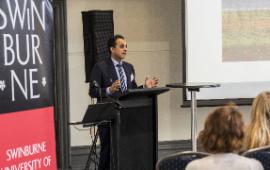Unlocking the brain at Swinburne’s Centre for Mental Health

In Summary
- Swinburne launches Centre for Mental Health
- Centre to focus on improving mental health through research, development, training, policy and the dissemination of health information
Studying mental health disorders at their most severe will help researchers unlock the mysteries of the brain, the launch of Swinburne’s Centre for Mental Health (CMH) has heard.
Keynote speaker, Professor Gin Malhi, Executive and Clinical Director CADE Clinic Royal North Shore Hospital, told the launch that understanding the mechanisms of mental health disorders is the only way to find solutions.
“That’s only going to be possible if you look at the severe, chronic and persistent conditions,” he says.
“The moon landing was easy. They had hundreds of years of knowledge to build on … trying to understand human behaviour is much harder.”
He praised the CMH for introducing a centre that has a well-developed executive committee, as it encourages collaboration and the sharing of new ideas.
“Having this committee within CMH is great, as it will help to challenge ideas. Too many centres are led by one individual,” he says.
Swinburne’s mental health mission
At the launch, inaugural centre director Professor Susan Rossell outlined CMH’s plan to focus on improving mental health through research, development, training, policy and the dissemination of health information.
The centre will also look at the persisting mental health problems that are associated with high levels of disability and service need.

“Our goal is to improve our understanding of the mechanisms involved in severe mental health disorders and to improve the lives of people with a severe mental illness, through high-quality research and the translation of research into practice and policy,” says Professor Rossell.
Dual research streams
The CMH is focusing on two streams of research:
- The mechanisms underpinning mental health problems;
- The treatments for mental health problems
The aim of the first stream is to complete high-quality research examining the mechanisms that interact in the developmental of mental health conditions, says Professor Rossell.
Such processes include social, psychological, cognitive and neurobiological factors. Identifying such factors will logically inform our development of novel treatments. Our mechanisms research is inter-disciplinary and involves the fields of psychology, neuroscience, psychiatry, genetics, neurology, mathematicians and biomedical engineers.
The second stream of research is focused on identifying and developing novel treatments for mental health conditions, particularly self-management and other cutting-edge interventions.
The CMH is located at Swinburne’s Hawthorn campus.
For more information, see: Centre for Mental Health website

